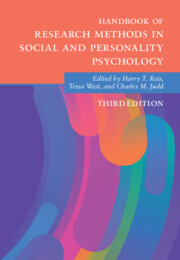Book contents
- Handbook of Research Methods in Social and Personality Psychology
- Cambridge Handbooks in Psychology
- Handbook of Research Methods in Social and Personality Psychology
- Copyright page
- Contents
- Figures
- Tables
- Contributors
- Introduction
- 1 The Romance of Research Methods
- Part I Before You Dive In
- 2 Ethical Issues in Psychological Science
- 3 Replication in Social and Personality Psychology
- 4 Realizing the Promise of Diverse and Interdisciplinary Team Science
- 5 A Cross-Cultural Method in Social and Personality Psychology
- Part II Basic Design Considerations to Know, No Matter What Your Research Is About
- Part III Deep Dives on Methods and Tools for Testing Your Question of Interest
- Part IV Understanding What Your Data Are Telling You About Psychological Processes
- Index
- References
5 - A Cross-Cultural Method in Social and Personality Psychology
The Cultural Imagination
from Part I - Before You Dive In
Published online by Cambridge University Press: 12 December 2024
- Handbook of Research Methods in Social and Personality Psychology
- Cambridge Handbooks in Psychology
- Handbook of Research Methods in Social and Personality Psychology
- Copyright page
- Contents
- Figures
- Tables
- Contributors
- Introduction
- 1 The Romance of Research Methods
- Part I Before You Dive In
- 2 Ethical Issues in Psychological Science
- 3 Replication in Social and Personality Psychology
- 4 Realizing the Promise of Diverse and Interdisciplinary Team Science
- 5 A Cross-Cultural Method in Social and Personality Psychology
- Part II Basic Design Considerations to Know, No Matter What Your Research Is About
- Part III Deep Dives on Methods and Tools for Testing Your Question of Interest
- Part IV Understanding What Your Data Are Telling You About Psychological Processes
- Index
- References
Summary
This chapter highlights the utility of cultural imagination, the ability to see human behaviors not just as the result of their dispositions or immediate situations but also as the result of larger cultural contexts. Our cultural imagination, as researchers, evolves as we are increasingly exposed to ideas from different parts of the world, either through collaboration with other researchers or interacting with individuals outside our immediate cultural context. While cross-cultural research has become simpler with the rise of the Internet, there still remain many challenges. This current chapter delineates concrete steps one can take to conduct an informative cross-cultural study, increasing the diversity of databases for generalizable theories of personality and social behaviors.
- Type
- Chapter
- Information
- Publisher: Cambridge University PressPrint publication year: 2024

